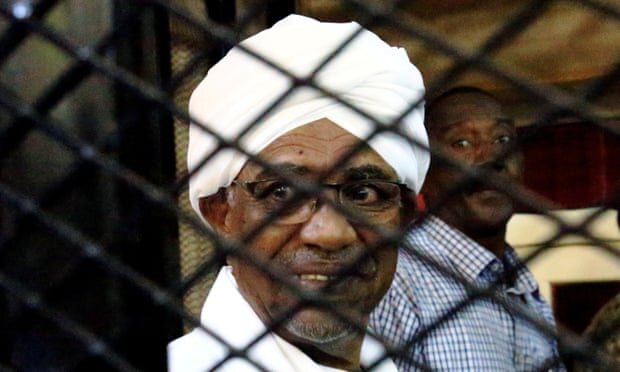Chronology of Sudan coup

Here is the time line and some key events that led to the fall of al-Bashir.
Anti-government demonstrations erupt across Sudan in Dec. 2018, initially over steep price rises and shortages, but soon shifted to calls for al-Bashir to step down. Security forces respond with a fierce crackdown that kills dozens.
By February 2019, al-Bashir declares a state of emergency.
On April 6 a large sit-in protest begins outside the military’s headquarters in Khartoum. Over the next five days, security forces kill 22 people in attempts to clear a sit-in. The protests gained momentum after the resignation of Algeria’s President Abdelaziz Bouteflika, in power for 20 years, in response to demonstrations.
On April 11, Sudanese army arrests al-Bashir. He was later convicted of corruption and in December 2019 was sentenced to two years in prison for the elderly.
The military took over control of Sudan and the Transitional Military Council (TMC) was formed, headed by Lt. Gen. Abdel Fattah al-Burhan and his deputy General Mohamed Hamdan Dagalo.
Dagalo is also the leader of Rapid Support Forces (RSF), a paramilitary group formerly known as the Janjaweed when it committed atrocities and massacres against rebels in the Darfur region. He was a close political ally of Omar al-Bashir, but as the protests against the former leader escalated in December, his loyalty soon wavered.
Soon after the April coup, a Montreal-based Canadian firm Dickens & Madson Inc. signed a $6-million contract with Dagalo to polish the image of TMC.
Dickens & Madson Inc. is headed by Ari Ben-Menashe, an Iranian born former Israeli intelligence officer whose firm has previously served as a paid lobbyist of ousted Zimbabwean dictator Robert Mugabe and powerful Libyan warlord Khalifa Haftar, head of Libyan National Army.
The Canadian newspaper the Globe and Mail reports that according to a contract filed with the U.S. government, the firm has been lobbying for executive and legislative branches of governments of the U.S., Russia and Saudi Arabia.
Ben-Menashe was under investigation by Canadian RCMP after Amnesty International warned Canadian government that Ben-Manashe’s attempt to build a partnership between Sudan military and the Libyan militia could be a violation of Canadian sanctions and would deepen human-rights crisis in both countries.
In its letter to the federal cabinet ministers, Amnesty noted that Sudan’s military regime is accused of storming a hospital in Khartoum, firing live ammunition at patients and medical staff, dumping the dead bodies of protesters into the Nile River, committing war crimes in Darfur and shutting down the Internet to prevent the protesters from communicating.
“A sense of fear and terror prevails in the country,” the letter said.
In early June 2019, following Burhan’s and Dagalo’s visits to the Egyptian, UAE and Saudi leaders, the Sudanese Security Forces and RSF, including Janjaweed militias, cracked down on peaceful protests in Sudan, which became known as the 3 June Khartoum massacre. Dozens of peaceful protesters were killed and about forty of the bodies were thrown in the river Nile, hundreds were tortured, violated and raped in the streets of Khartoum.
After the massacre was criticized by international media TMC demanded refund from the $6m contract from Ben-Manashe for the media outrage.
When the Canadian Globe and Mail newspaper asked for comment on the massacre, Ben-Manashe said Gen. Dagalo is “surrounded by some very hot heads. I had to give him the benefit of doubt too because he is a cool guy. He is not a bad guy … He sort of got off the rails for a while.”
Ben-Manashe’s investigation by the Canadian RCMP did not go anywhere and undoubtedly he is the catalyst for Netanyahu’s meeting with Burhan.
Amid protests and demands for the military to hand over the power to a civilian rule, a power-sharing arrangement between the military and civilian parties was made on August 21, forming 11-member Sovereign Council. The council includes six civilians and five soldiers. Dagalo was appointed to the council.
Abdalla Hamdok was declared the prime minister and he formed a cabinet.
Burhan is the most senior figure in the first phase of the power-sharing arrangement in which civilian authorities are due to take the lead for the final 18 months of the 39-month transition. Elections are slated for 2022.
On February 11th the new Sudanese government agreed that Omar al-Bashir would appear before the International Criminal Court (ICC) after being indicted for war crimes, crimes against humanity and genocide for more than a decade. Bashir, who seized power in 1989, now languishes in a Sudanese prison after being swept from the office last April after losing support from military amid a popular uprising.
Leave a Comment